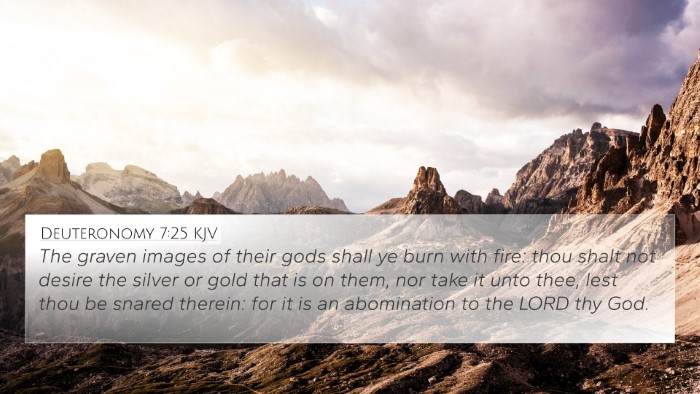Understanding Isaiah 31:7
Isaiah 31:7 states, "For in that day every man shall throw away his idols of silver and his idols of gold, which your own hands have made for sin." This verse holds significant implications regarding idolatry, human reliance on material possessions, and the ultimate recognition of God’s sovereignty. Below, we explore the meanings and interpretations gathered from notable public domain commentaries, providing a comprehensive understanding of this scripture.
Significance of Idols in Isaiah 31:7
This passage emphasizes the futility of trusting in idols made by human hands. The context shows that when faced with impending judgment or calamity, individuals will finally recognize the uselessness of their idols.
- Matthew Henry highlights that the people of Israel, in their reliance on these man-made idols for assistance and protection, reveal a deep-seated folly. They are encouraged to turn away from these false gods and recognize their reliance on the one true God.
- Albert Barnes indicates that this verse prophetically depicts a time of great trial when the realization and rejection of idolatry become inevitable. The act of throwing away idols symbolizes repentance and a turning towards God.
- Adam Clarke observes the transition in the hearts of the people, where the acknowledgment of their sins leads them to discard their idols as a confession of guilt. This act signifies a profound change in their relationship with God.
Bible Verse Cross-References for Isaiah 31:7
For a deeper understanding and to identify connections between Bible verses, several related scriptures can be cross-referenced:
- Exodus 20:4-5 - God's command against making idols and the consequences of idolatry.
- Isaiah 2:20 - A similar proclamation regarding throwing away idols on the day of the Lord.
- Jeremiah 10:14 - A declaration that those who make idols are foolish; their idols cannot save them.
- Hosea 14:8 - A call for Israel to abandon their sins and turn back to God.
- Acts 19:26-27 - Reference to the impact of the message of God on the idolatrous practices in Ephesus.
- 1 John 5:21 - A New Testament exhortation to keep oneself from idols.
- Psalm 115:4-8 - A description of idols and the futility of worshiping them.
- Ezekiel 14:6 - God's call to the house of Israel to turn away from their idols.
- 1 Corinthians 10:14 - An admonition to flee from idolatry.
- Revelation 21:8 - A warning about the fate of those who practice idolatry.
Thematic Bible Verse Connections
Through the thematic connections established in these cross-references, several key themes arise:
- Judgment and Repentance: Isaiah 31:7 signifies a moment of realization for the people, signaling God's impending judgment and their need for repentance.
- Idolatry's Futility: The repeated admonitions throughout the Bible underscore the theme that trust in idols is misplaced and ultimately fruitless.
- God’s Sovereignty: These passages collectively affirm the central tenet that the Lord alone is sovereign and worthy of worship.
Tools for Bible Cross-Referencing
To explore these connections, consider utilizing various tools for Bible cross-referencing:
- Bible Concordance: A helpful resource to find where specific words appear throughout scripture.
- Bible Cross-Reference Guide: Guides that outline connections between verses, offering insights into thematic ties.
- Cross-Reference Bible Study: Engaging with scripture in a way that explores underlying relationships and themes.
- Bible Reference Resources: Various study Bibles and literature that provide comprehensive references for deeper understanding.
Applying Cross-Referencing in Study
When studying Isaiah 31:7, applying cross-references can illuminate the rich, interconnected narratives of the Bible. Here’s how:
- Identifying Connections: Use cross-references to connect the themes of idolatry and repentance found throughout both the Old and New Testaments.
- Comparative Studies: Conduct a comparative study of the warnings against idolatry present in the writings of the prophets versus those in the New Testament epistles.
- Inter-Biblical Dialogue: Analyze how Isaiah's message resonates with the teachings of Jesus and the apostles regarding the nature of true worship.
Conclusion
In summary, Isaiah 31:7 serves as a crucial reminder of the importance of recognizing the futility of idolatry and the necessity of turning towards God. By engaging with this verse through cross-references and thematic studies, one can gain a more profound insight into the overarching narratives of faith, repentance, and God’s unwavering sovereignty throughout the Bible.









